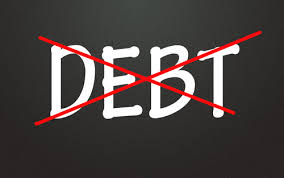 It seemed like a good purchase at the time, but now you are left with staggering credit card payments you really can’t afford. If that sounds familiar, it may be time to take steps toward resolving your debt situation. After all, accumulating massive debt amounts and missing payments can negatively impact your credit and make it harder to borrow in the future. Consider if one of these four strategies would fit into your financial profile.
It seemed like a good purchase at the time, but now you are left with staggering credit card payments you really can’t afford. If that sounds familiar, it may be time to take steps toward resolving your debt situation. After all, accumulating massive debt amounts and missing payments can negatively impact your credit and make it harder to borrow in the future. Consider if one of these four strategies would fit into your financial profile.
debt free
 In today’s uncertain economy looking after your money has become more important than ever, so it’s necessary that you know exactly how much’s in and coming out of your account. No one likes the idea of getting into debt as it can be stressful, demoralising and financially damaging for years to come, however, there are a few ways you can avoid it. If you’re looking to keep your finances healthy then you’ll want to check out our quick tips for feeling confident and in control of your money.
In today’s uncertain economy looking after your money has become more important than ever, so it’s necessary that you know exactly how much’s in and coming out of your account. No one likes the idea of getting into debt as it can be stressful, demoralising and financially damaging for years to come, however, there are a few ways you can avoid it. If you’re looking to keep your finances healthy then you’ll want to check out our quick tips for feeling confident and in control of your money.
Start A Rainy Day Fund
We never know what’s going to happen be it next year, next week or even tomorrow, so it’s vital that everyone has a little nest egg to fall back on. Savings accounts are ideal places for large amounts of money such as inheritances, trust funds, and even pension payouts. The right savings account, or ISA, can earn you money just by it sitting there although be aware many have a ninety day clause, meaning you need to notify the bank ninety days in advance before making a withdrawal.
 Getting into debt isn’t a very nice feeling. Whether you took out loans that you couldn’t afford to repay, or you’ve been living beyond your means, you need to get your debt under control. Getting your debt under control as soon as possible is so important, or you might find that it spirals out of control. Here’s everything you need to do to get your debt under control:
Getting into debt isn’t a very nice feeling. Whether you took out loans that you couldn’t afford to repay, or you’ve been living beyond your means, you need to get your debt under control. Getting your debt under control as soon as possible is so important, or you might find that it spirals out of control. Here’s everything you need to do to get your debt under control:
See a Financial Advisor
A financial advisor can take a look at your finances, ingoings, outgoings, and give you some valuable advice. If you feel stuck with nowhere else to turn, this is the first step to getting your life back on track. Don’t be afraid to book an appointment and see what can be done. You should feel much better afterwards and you’ll see that there’s a light at the end of the tunnel.
 Most of us would agree with the fact that it is a smart decision to go to college and earn a degree; especially being that there are many studies to support the fact that the average college graduate earns about $20,000 per year more than someone in the workforce who only has a high school diploma.
Most of us would agree with the fact that it is a smart decision to go to college and earn a degree; especially being that there are many studies to support the fact that the average college graduate earns about $20,000 per year more than someone in the workforce who only has a high school diploma.
That’s not to say that college is not a huge financial investment. So much in fact, that an overwhelming majority of college graduates leave college with as much as $23,000 worth of student loan debt that must be paid back. It doesn’t have to be that way for everyone, though. Below, we’ve enclosed five tips on how you can graduate from college without owing a single dime.
Take some college courses in high school. When you go to college, you are paying for each class that you take. The good news is that a large majority of high schools offer advanced placement classes that are available to juniors and seniors. By taking a few of these qualifying classes, high school students can easily shave off a semester or two of college once they enroll. (Also check with your guidance counselor to see if there are actually college courses offered at your school as well.)
 I’m sure everyone has heard the phrase, “Buy now, pay later.” Almost every major furniture and appliance company has this kind of offer. You can also often purchase electronic devices and all kinds of other gadgets this way. Well, I want to be a bit contrary here and suggest that when you make purchases, whether they are big or small, pay for them at the time of purchase rather than waiting to pay. Below are some reasons why I am suggesting this:
I’m sure everyone has heard the phrase, “Buy now, pay later.” Almost every major furniture and appliance company has this kind of offer. You can also often purchase electronic devices and all kinds of other gadgets this way. Well, I want to be a bit contrary here and suggest that when you make purchases, whether they are big or small, pay for them at the time of purchase rather than waiting to pay. Below are some reasons why I am suggesting this:
1. Who wants extra debt? Buy paying later you have taken on yet another debt that you will eventually have to pay. Wouldn’t you rather just pay for it and get it over with?
2. If you wait to make your purchase until you save up enough money, you will be more certain that it is really what you want. You are less likely to impulse buy if you discipline yourself to ensure you have the funds before making purchases.
3. By paying now you will eliminate the possibility of having to pay interest charges on your purchase.
4. If you decide to pay later, there is a chance that you may forget about it and not save an adequate amount of money in order to make the payments once they begin.
That being said, there is one situation where I think buying now and paying later could be financially beneficial. For instance, you buy a washer and dryer for $1000. The offer is to pay for the appliances in 2010 but you don’t have to pay interest. You currently have the money available to pay now, but since you won’t have to pay interest, you decide to invest the $1000 instead. Then, in 2010, you pay for your purchase in full, after having earned interest on your money through your investment. In my opinion, that would be the only time it would make sense to buy now and pay later when it comes to making small and medium-sized purchases.
